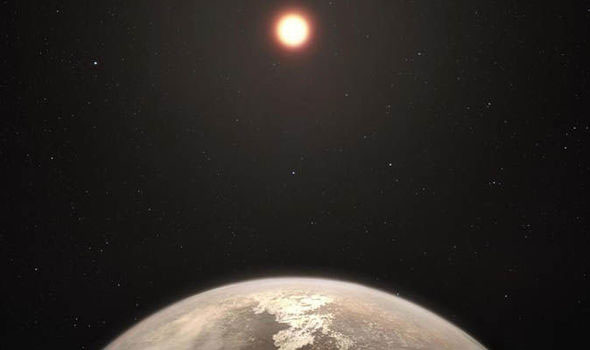Detecting a temperate planet is easier than Earth
Ross 128b, the planet belongs to another solar system in the constellation Virgo, is capable of surviving better than Earth. One year on this planet is only 9.9 days.
A multinational study, published in the Astrophysical Journal Letters, presented surprising data about a "light" of about 11 light years: Ross 128b.

The newly discovered planet may have a more pleasant climate and survival ability is higher than the earth - simulated images of ESO.
Ross 128b belongs to another solar system centered on Ross 128 red dwarf, also known as Proxima Virginis , in the Virgo constellation. Ross 128b is 1.7 times smaller than the earth and closer to the central star than the distance between the earth and the sun is 20 times. One year on this planet is only about 9.9 days.
However, in the new study, Dr. Diogo Souto from the Brazilian National Observatory, said calculations showed a balance between the distance and the central star heat radiating to the climate in most Upper Ross 128b is like the temperate climate of the earth, extremely pleasant.
In particular, a large warm area may have a temperature of up to 20 degrees Celsius, while the coldest place in the poles is minus 60 degrees Celsius.
More surprisingly, when taking into account factors that support life, the planet shows a 1.35 times higher probability of life appearing than our planet.
According to co-author Johanna Teske, from the Carnegie Institute of Science (Washington DC - USA), their group is continuing to learn about the atmosphere there and is hoping it is quite similar to the earth.
The team also hopes that a "super telescope" under construction at the La Silla Observatory (Chile) after completion will help them in observing and evaluating biomarkers on the planet. The discovery of life here seems very positive after the new findings and this is also one of the closest Earth copies found by scientists so far, with only 11 light-years away.
- Detecting rocky planet resembles Earth
- Detecting water on a distant planet
- The most Earth-like planet shows up
- Detecting the youngest alien planet
- Your planet is closest to Earth
- Detecting a planet hot ice
- What new planet is '2nd Earth'?
- Detecting a 'lonely' planet near Earth
- Information about 'Second Earth'
- Detecting planets can live near Earth
- 2 copies of Earth crashed into each other, shooting debris across space
- Detecting a planet with life
 Van Allen's belt and evidence that the Apollo 11 mission to the Moon was myth
Van Allen's belt and evidence that the Apollo 11 mission to the Moon was myth The levels of civilization in the universe (Kardashev scale)
The levels of civilization in the universe (Kardashev scale) Today Mars, the sun and the Earth are aligned
Today Mars, the sun and the Earth are aligned The Amazon owner announced a secret plan to build a space base for thousands of people
The Amazon owner announced a secret plan to build a space base for thousands of people